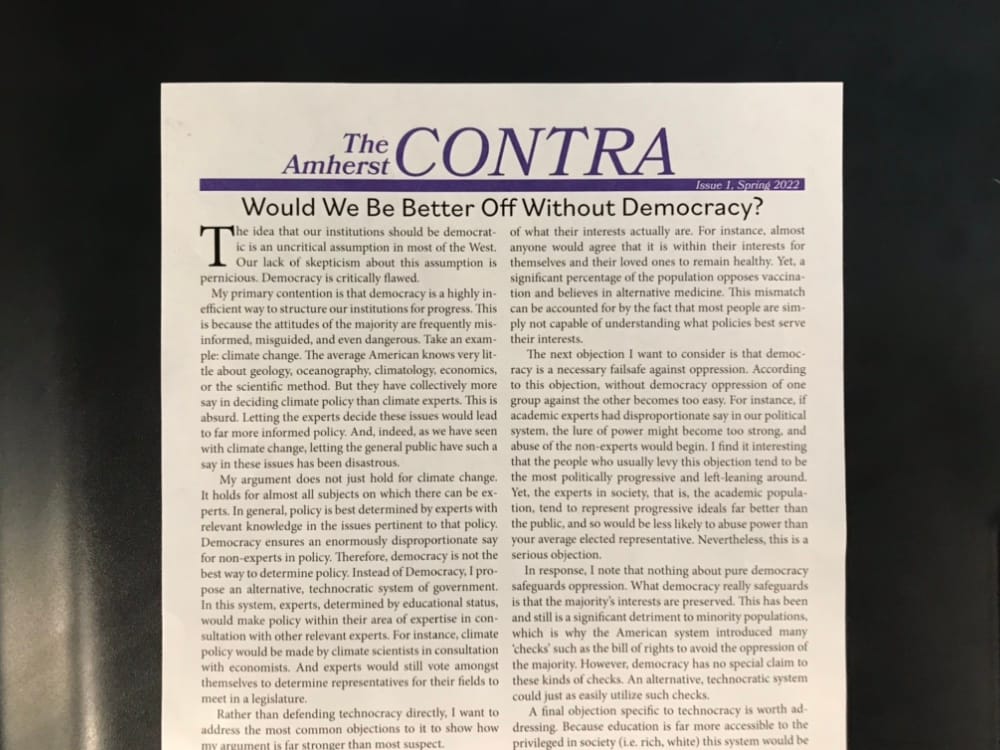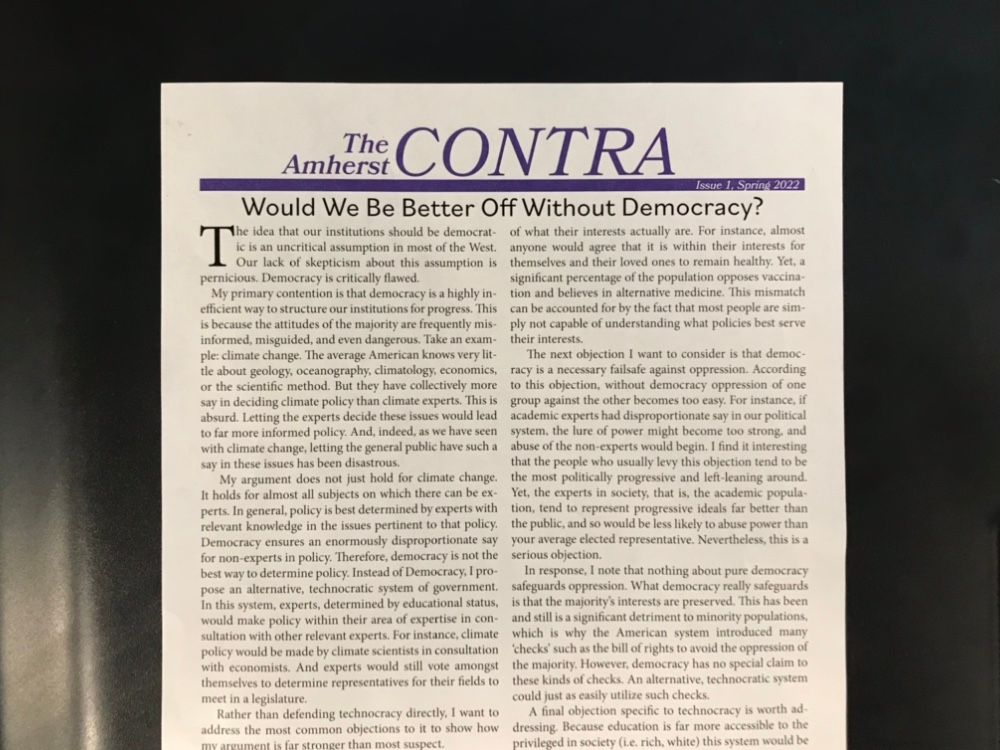In Defense of Democracy, a Response to The Contra
Tylar Matsuo '24 defends the ideal of the democratic state in response to an article published in the intentionally divisive Amherst Contra.


This past week, the perpetually crowded bulletin boards in the front entrance to Valentine Dining Hall were graced by a new addition: an anonymously published opinion article that openly advocated for the abolition of democracy, printed in the first edition of the controversial-by-design Amherst Contra.
After years of intense polarization and political turmoil within the American system, I cannot but sympathize with those who find themselves questioning whether our Founding Fathers made some crucial error. However, whatever errors may have been made, the selection of a democratic system was not one of them. Democracy allows every citizen’s viewpoint to be counted, granting each and every one of us a say in how our lives are governed. This is not a right that should be taken for granted, and the public is not a blind toddler fumbling in the dark after good policy. I hope to demonstrate this while directly addressing the points raised by the anonymous author.
The author proposes technocracy, or rule by experts, as an alternative to democracy, with expertise determined by an individual’s educational status. This system, the author argues, would avert the disastrous results of climate inaction and other crises by removing the influence of the uninformed general public.
This argument ignores the roles of the authoritarian giants Russia and China, as well as various smaller authoritarian states, in contributing to and perpetuating the climate crisis. These non-democratic states have not pursued responsible climate policy. And more to the point, China, the world’s second largest polluter by cumulative emissions and first by annual emissions, functions as a meritocracy, ruled by the well-educated.
The author stated that their system would permit climate scientists to directly set climate policy, however that system could not in practice differ much from the system of China — or, for that matter, the American EPA. Climate scientists’ policies would interfere with the jurisdictions of other groups of experts, and must be implemented by still other entities. Once economists and agricultural specialists become involved in the debate, the deciding body ceases to be made solely or even predominantly out of climate scientists, and disagreements and deadlock become all the more severe.
Additionally, the system would still need an executive — likely uneducated in climate science — to implement policy and determine which issues are worth delegating to which experts, and when they ought to be delegated in response to changing conditions. Although our republic is not ideal, it has routinely produced educated executives and legislators, advised by experts at well-funded institutions — of which Dr. Fauci of the National Institute of Allergies and Infectious Diseases is but one. These experts are those appointed to tackle problems pertinent to the people overseen by an accountable government, rather than those that might be elevated by a small group of unaccountable elites.
The author further argues that their experts would be better informed about the needs of the general public than the public itself, citing vaccine opposition as an example. The counterpoint to this is remarkably simple: the majority of the population is, in fact, favorable to vaccination. In every state except Alabama a majority of the total population has been fully vaccinated, and in every state except Alabama over 60% of the adult population has been fully vaccinated (even Alabama fails to meet both metrics by only 0.2 percentage points). The author’s claim that “most people are simply not capable of understanding what policies best serve their interest” is tenuous at best in light of this data. As a historical example, consider the actions of the British Empire, whose educated parliament pursued disastrous colonial policies justified by a belief that they were able to provide better governance for local populations than those populations were for themselves.
The well-educated elite are also not immune to oppressive decision-making. The author claims that because the academic population tends towards progressive ideals they would be less likely to abuse power than a more moderate elected representative. This is a false equivalency. The far-left USSR’s perpetration of the Holodomor Genocide and its offenses against the Jewish Refuseniks (whose plight was described by Dr. Lipstadt in her virtual lecture on Feb. 10) are a striking demonstration of the horrors that might be inflicted by an unaccountable left-wing regime. Democracy is not immune from the evils of abusive governance either, but it does at least have the ultimate check of the ballot box, which autocracy does not permit.
Finally, the author briefly mentions the classist and racist nature of their system of governance. Because educational attainment is hidden behind a paywall in much of the world and the United States in particular, a system enfranchising only the educated would inevitably exclude the poor, who are disproportionately members of minority groups. The author excuses this discrimination by indicating that the present American system of governance already privileges certain groups above others.
However, the existence of discrimination does not — and must never — justify its perpetuation. To allow discrimination to be self-justifying is reprehensible; no discriminatory policy should be enacted simply because another discriminatory policy has already been enacted. The author claims that the primary bar to social equality in contemporary society is the public’s ignorance towards systemic discrimination; I claim instead that while ignorance is certainly unhelpful, the primary bar to social equality is the systemic discrimination itself, of which the author’s elitist system would be a prime example.
I close this piece with a note about The Amherst Contra, the forum in which the anonymous author published their work. The double-sided broadside Contra intends to devote itself to the publication of unpopular opinions and, in doing so, spark discussions that otherwise would not occur. Unfortunately, The Contra’s small physical size prevents it from accepting response letters greater than 250 words in length, one of the reasons why I have chosen to publish this article in The Student instead.
While I wish The Contra well in its mission, I caution that a publication of its nature cannot avoid extremism. Unpopular opinions are often unpopular for a good reason. Although they should be permitted publication when they are not in themselves harmful, these pieces can still have far-reaching repercussions — consider the ramifications of the anonymous author’s piece on anti-intellectualism. An open call for government by the educated elite cannot but spark rightful anger from those who would be barred from civic participation. I maintain that our long-standing assumptions should be questioned, but that questioning must not be divisive for divisiveness’s sake.



Comments ()